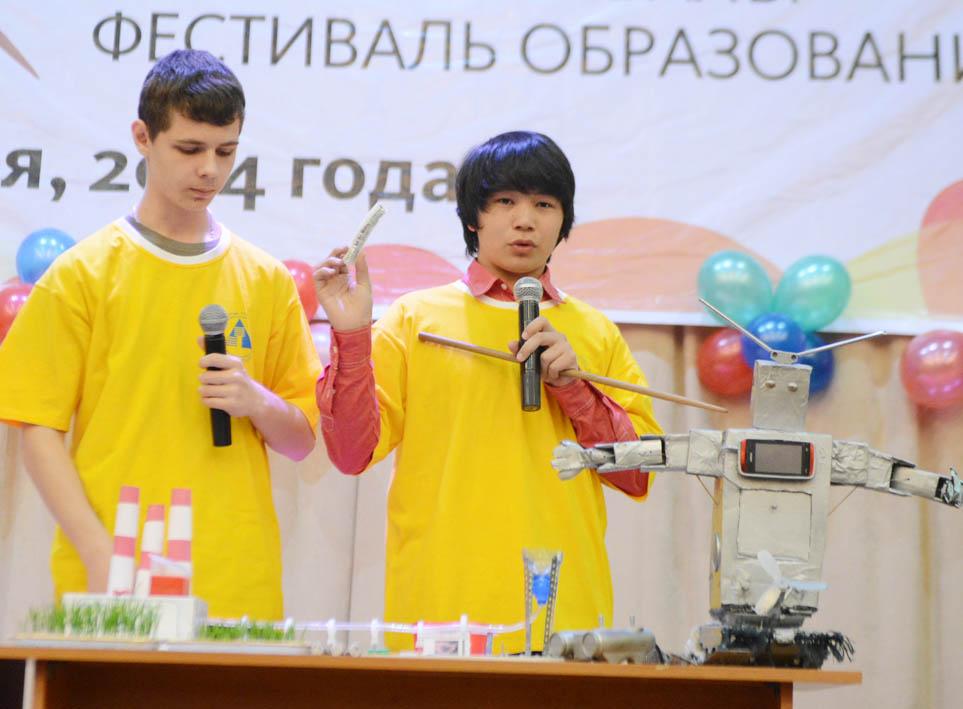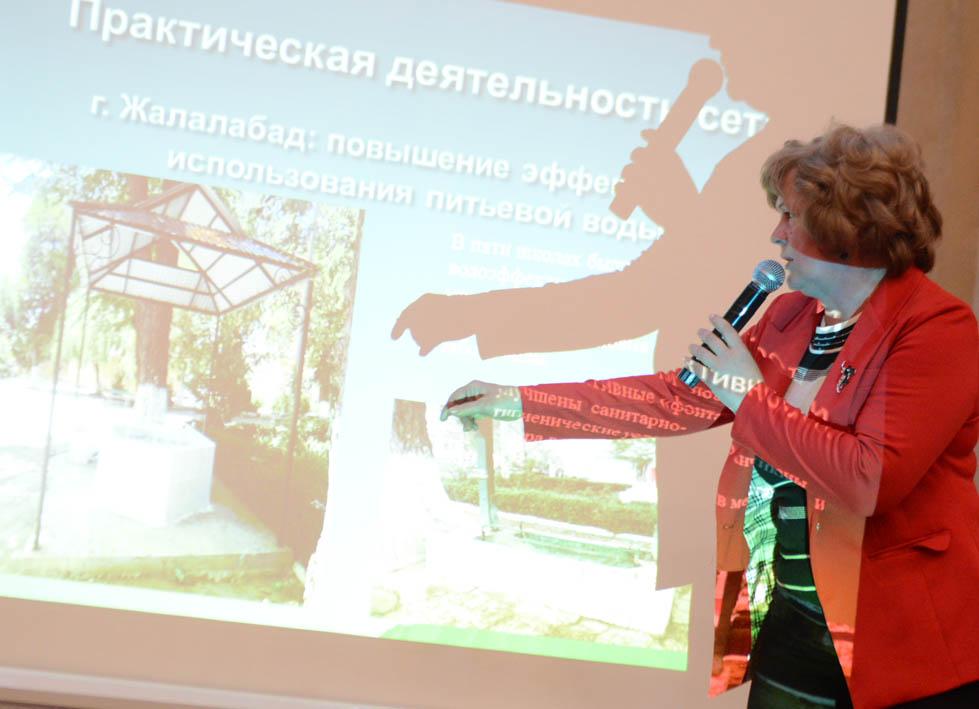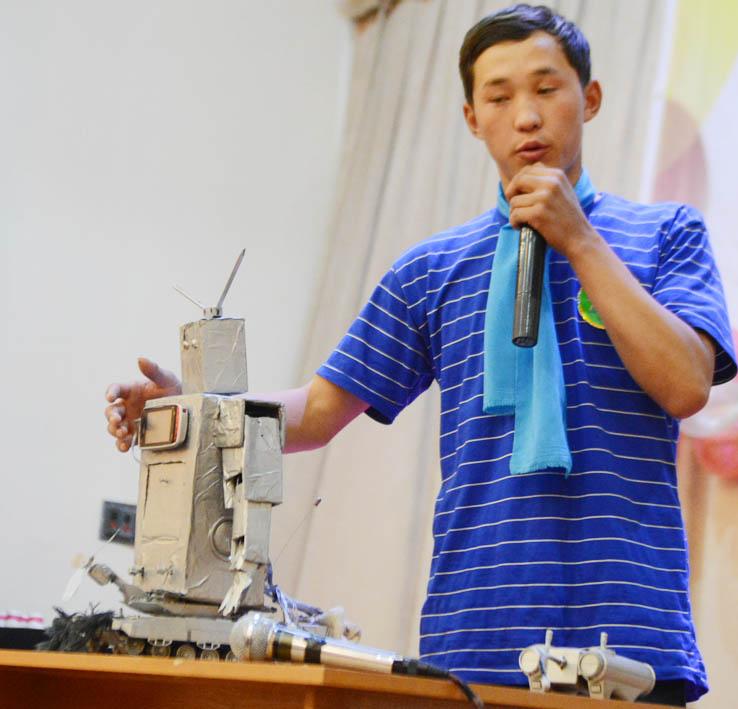Day One: Professional Forum
April 26, 2014, 06:00
Yesterday, April 26, the large auditorium of KSTU hosted the "Professional Forum" which provided experts and professionals an opportunity to hear success stories, talk about innovation in education and find presentations of innovative projects.
During the event, there was a public defense of three youth projects as part of the "We are 21st Century Intellectuals" international competition. The purpose of the defenses were to tell the goals, objectives, relevance of each project, and to submit layouts or models that explain investigated or invented, etc. Judges and other guests of the event graded the defenses. Anyone from the audience could ask the contestant a question about his project.
Project defenses:
1) Representative of Team Issyk-Kul: Temirlan Kabylbekov of Jumabeav S, 8th grade. Project: "Robot." Introduction: Economics issues.
2) Representative of Team Talas: Omurbek Alymkulov. Talas City Lyceum-Complex. 11th grade. Project: “Composting and its Uses.” Introduction: Composting at home to improve soil quality indicators.
3) Representatives of RDITA Altyn Tuyun. Isa Alybaev and Dmitri Gubeev. GK No. 26, 8th grade. Project: "How do you make a pair of stones?" Introduction: Research into and innovative design of cost-effective methods of coal production and transportation in mountainous terrain.
The following gave their “Success Stories”:
Mirbek Asangariev – Chairman of the Bishkek Business Club, director of the Association for Social Entrepreneurs
Fatima Karabaeva – ’93 graduate of vocational school, private entrepreneur
Alaibek Obozov – Doctor of technical science, professor and academic at the Academy of Engineering of the Kyrgyz Republic
Tatiana Konovalova – Graduate of KSTU, Director of the Akmena Public Association
The second part of the “Professional Forum” was dedicated to innovations in education.
Free online service www.codecademy.com presented “Bizdin Muras”
Codecademy is a free online courses on interactive programming where users can learn to program without prior training on many modern, popular programming languages like HTML, CSS, Jquery, JavaScript, Python and Ruby in a fun way. Experts have praised it as a resource. Millions of users from around the world visit daily. In England there is a process of adapting Codecademy courses for students learning computer programming.
In early 2013 it was decided to make this wonderful resource available in the Kyrgyz language. After receiving permission from the administration these young men applied for and won a grant from Soros-Kyrgyzstan project to localize the program. A telecom operator Beeline also supported the project. Now the resource is localized and ready to train Kyrgyz students to the basics of programming. The purpose of this service is to disseminate high-quality and free education programming in the Kyrgyz language throughout the country, effectively internationalizing local students in terms coding knowledge.
Electronic education resources in the Kyrgyz Republic – Also from the guys at “Bizdin Muras.” This project’s purpose is to promote Kyrgyz language literature electronically, via the website www.bizdin.kg. Www.bizdin.kg is a free e-library of Kyrgyz language books. Project designers also talked about the possibilities of free an accessible education in Kyrgyzstan.
The third project “Renewable Energy” was presented by doctor of technical sciences, professor and academic at the Academy of Engineering, Mr. Obozov.
The “Video on General Subjects in the Kyrgyz Language” project (www.bilimkeni.kg) introduced the first Google certified teacher in Central Asia, information technologies trainer and designed of several innovative education projects, Tynchtykbek Zhanadylov (of “Steps to Success”). One of the main goals of this project is to introduce multimedia educational tools into school classes. It will also enhance educational content on the internet. It has developed and distributed 720 video tutorials in the style of the “Khan Academy.”
The "Paperless School" Project– Despite the fact that we live in an era of advanced information technology, our schools still operate as they did 30 years ago. For example, schools use paper to produce magazines, teachers’ schedules, charters and other documents.
At any given school, school newspapers use Whatman paper. Google is currently offering its services for the implementation of information technology in education via a solution similar to Google Apps. This has been applied in seven schools in Kyrgyzstan
1. Secondary School. "Olympus" Osh http://www.osholimp.info/
2. T.Satylganova Secondary School, Karakol http://www.tslyceum.info/
3. Secondary School Number 62 , Bishkek http://www.62bishkek.info/
4. Chkalova School, Naryn http://www.chkalovnaryn.info/
5. Kochkorbaeva School, Talas region http://www.kochkorbaev.info/
6. Secondary school number 14 , Jalal - Abad http://www.sch14gja.info/
7. NL them " Issyk- Kөl " Isfana http://www.schysykkol.info/
The “Paperless School” project was implemented by Soros KG via the Steps to Success NGO.
Project Reset aims to increase student training session attendance by identifying effective mechanisms and ways to implement them. Project managers hope to create an intellectual platform for students to access information.
Kasim Baryktabasov, Senior Lecturer KTU Manas, talked about the “BILIM-Sapat – Monitor” project. This project was designed to automate the management processes of general educational institutions thereby ensuring positive outcomes and quality learning.
The system was developed using free software. The system is designed for use by the heads of academic organizations, educational institutions (high schools) and allows them to automatically calculate the indicators for performance, quality and the average score of students in their subjects and classes.
Energy Efficient Schools – Submitted by the “BIOME environmental association. SPARE (School Project on the use of Resources and Energy) – the world's largest international educational project on climate change, energy and the environment for students. It involves more than 6,000 schools and 500,000 students from Europe, the Caucasus and Central Asia. The Norwegian Society, "Friends of the Earth," initiated the program for the conservation of nature.
SPARE is an innovative project in which the formation and action of schoolchildren promote "green" energy and help to slow climate change, where the public helps to promote the ideas and solutions for sustainable development.
Today, a network of national environmental NGOs that coordinate SPARE in 13 countries.
Lastly, the "Public School Young Leaders of Kyrgyzstan” is a special project and education program of the "Progressive Initiatives Fund, that focuses on education and the creation of a new generation of model young people. Research activities of the school aim to develop the intellectual and scientific potential of young people, motivating and engaging them actively in research and analysis.


